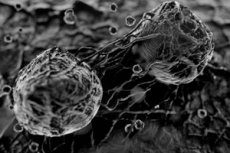
科学家发现了17个额外的基因,这些基因会导致突变血细胞随着年龄增长而异常生长。这项发表在《自然遗传学》杂志上的研究成果,更全面地展现了克隆性造血背后的遗传因素。克隆性造血是与衰老相关的过程,会增加罹患血癌的风险。
来自威康桑格研究所、加州卡利科生命科学公司和剑桥大学的研究人员分析了英国生物样本库中超过20万人的测序数据。他们寻找那些显示“正向选择”信号的基因,即突变会导致突变细胞群体随着时间的推移而显著扩增。
所鉴定的 17 个新基因与之前已知的与克隆性造血有关的突变所导致的疾病相同,凸显了它们在驱动突变血细胞克隆积累方面的临床意义。
这些此前未被认识的遗传驱动因素的发现,为研究克隆性造血的分子机制及其在疾病中的作用开辟了新的途径,有望催生出改善健康老龄化的新方法。它还可能带来更精准的基因检测,帮助识别血癌和心血管疾病的风险。
随着年龄的增长,我们的细胞会积累随机的基因突变。其中一些突变可能提供竞争性生长优势,使突变细胞能够增殖并超越健康细胞,形成庞大的“克隆”,即相同的突变细胞群。当这种正向选择发生在血液干细胞中时,被称为克隆性造血。这一过程与血癌、心血管疾病和其他与年龄相关的疾病有关。
尽管之前的研究已经确定了大约 70 个与克隆性造血有关的基因,但大多数新观察到的病例与任何已知驱动基因的突变无关,这表明还涉及其他遗传因素。
研究人员利用英国生物样本库(UK Biobank)超过20万个体的外显子组测序数据,绘制了衰老血液系统中正向选择的特征模式。除了已知的驱动基因外,他们还发现了17个驱动突变细胞克隆在血液中积累的基因。
这些新发现基因的突变使英国生物银行队列中克隆性造血的患病率增加了 18%,突显了它们对衰老的影响。
桑格研究所这项研究的合著者迈克尔·斯宾塞·查普曼博士表示:“虽然现有的基因检测对疾病的早期发现很有帮助,但我们的研究结果表明,仍有改进的空间。通过纳入这17个与克隆性造血相关的额外基因,我们或许能够改进基因检测方法,从而更好地识别与血癌和心血管疾病相关的风险。”
该研究的共同作者、曾在加州卡利科生命科学公司(Calico Life Sciences)工作、现就职于NewLimit公司的尼克·伯恩斯坦(Nick Bernstein)表示:“有了我们的新基因,我们现在可以更全面地了解情况,从而制定减缓或逆转突变血细胞异常生长的策略,以促进健康衰老。这些基因似乎会影响炎症和免疫力,而炎症和免疫力是心脏病和中风等疾病的重要因素。虽然基于这项研究的干预措施还有很长的路要走,但它为未来治疗多种疾病开辟了可能性。”
桑格研究所和惠康-MRC剑桥干细胞研究所的资深作者乔蒂·南加利亚博士表示:“我们的研究发现了一组更广泛的基因,这些基因会随着年龄的增长而导致突变细胞谱系的积累,但这仅仅是个开始。我们需要在不同人群中进行更大规模的研究,以确定剩余的驱动基因,并进一步深入了解这一过程及其与疾病的联系。”

